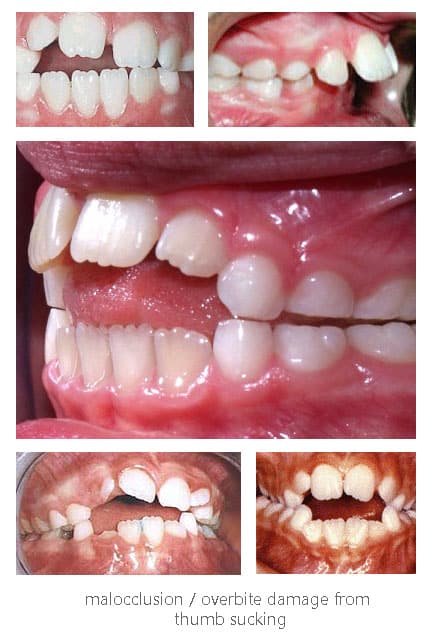Why do children begin thumb sucking?
From birth, all infants have a natural instinct to suck; this in order to receive nutrition through breast and bottle feeding, a behavior which is not only completely normal, but necessary for survival. From the very first time they engage in breast feeding, infants learn that sucking can not only provide valuable nourishment, but also a great deal of pleasure, comfort, and warmth. Whether from a breast, bottle, or pacifier, this behavior, over time, begins to become associated with a very strong, self-soothing, and pleasurable oral sensation. As the child grows older, and is eventually weaned off of the nutritional sucking, they can either develop alternative means for receiving those same feelings of physical and emotional fulfillment, or they can continue experiencing those pleasantly soothing experiences by beginning to suck their thumbs or fingers.
When should children stop thumb sucking?
Although thumb sucking (or finger sucking) is a perfectly natural habit, it can cause significant damage to a child’s physical, emotional, and social development, if left untreated past a certain age. Studies researched at major dental institutions have demonstrated that the best time to stop thumb sucking between the ages of three and four, while many pediatric dentists claim that the damage is reversible if the child stops before the onset of permanent teeth, which occurs around ages five to six [1] & [3].
What kind of damage can excessive thumb or finger sucking cause?
 When a child engages in thumb or finger sucking, a powerful vacuum is created inside of the mouth, which, at a younger age, was once necessary for feeding. This vacuum applies forces to the teeth in the upper and lower jaws, much the same way that braces do, causing the teeth to change their position over time. As the child grows, the suction present in thumb sucking causes the roof of the mouth to be pushed upward, and to narrow, which leads to a medical condition that dentists refer to as a cross bite. Cross bite, malocclusion, and other conditions that involve an improper positioning of the teeth relative to the tongue, can often cause children to develop speech impediments, or the inability to pronounce certain sounds. Unfortunately, for these children, the only remedy to these problems is expensive orthodontic work, which is often painful, time-consuming, and unsightly.
When a child engages in thumb or finger sucking, a powerful vacuum is created inside of the mouth, which, at a younger age, was once necessary for feeding. This vacuum applies forces to the teeth in the upper and lower jaws, much the same way that braces do, causing the teeth to change their position over time. As the child grows, the suction present in thumb sucking causes the roof of the mouth to be pushed upward, and to narrow, which leads to a medical condition that dentists refer to as a cross bite. Cross bite, malocclusion, and other conditions that involve an improper positioning of the teeth relative to the tongue, can often cause children to develop speech impediments, or the inability to pronounce certain sounds. Unfortunately, for these children, the only remedy to these problems is expensive orthodontic work, which is often painful, time-consuming, and unsightly.
What else should I know about thumb sucking?
Additionally, the child is at risk of becoming infected with any number of communicable diseases, as a result of putting dirty thumbs or fingers in their mouth. Some children experience social difficulties, as often children are taunted by their peers for engaging in what they can consider to be an “immature” habit. This taunting often results the child being rejected by the group or being subjected to ridicule by their peers, which can cause understandable psychological stress[2].
These problems can be avoided all-together, in as little as 3 weeks, by using TGuard ThumbGuard and FingerGuard, to stop the thumb sucking and finger sucking habit before it causes irreversible damage.
What other habits or conditions can be helped by the use of TGuard products?
Children suck their thumbs and fingers in order to relieve anxiety, to withdraw from stressful situations, or to simply relax before falling asleep. Some children develop additional habits to cope with these situations, such as hair pulling, eyelash pulling, and / or nose scratching. These habits all fall into the same category as thumb sucking, in that they provide a form of soothing relief to the child, and the connection between these habits are very strong. Parents who have children who have exhibited a combination of these habits, and then used ThumbGuard, have reported that all of the habits ceased after treatment and did not manifest themselves afterwards.
Additionally, for children who have epilepsy, cerebral palsy, or any other condition where the child is liable to involuntarily or voluntarily bite their thumbs or fingers, the ThumbGuard and FingerGuard can provide suitable protection to prevent damage to these areas.
If you are interested in other solutions to stop the habit, aside from TGuard, please click here.
SOURCES: 1. “Damage to the primary dentition resulting from thumb and finger (digit) sucking”, Journal of Dentistry for Children. Nov-Dec 1996. 2. “Influence of thumb sucking on peer social acceptance in first-grade children”, Pediatrics. April, 1994. 3. American Academy of Cosmetic Dentistry. “Thumbsucking – stop it early.” Feb. 1, 1999.
(Available upon request.)
